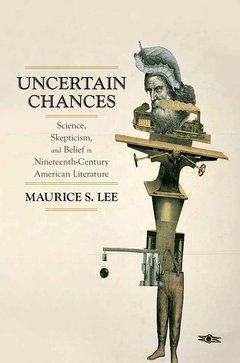Uncertain Chances Science, Skepticism, and Belief in Nineteenth-Century American Literature
Langue : Anglais
Auteur : Lee Maurice S.

The role of chance changed in the nineteenth century, and American literature changed with it. Long dismissed as a nominal concept, chance was increasingly treated as a natural force to be managed but never mastered. New theories of chance sparked religious and philosophical controversies while revolutionizing the sciences as probabilistic methods spread from mathematics, economics, and sociology to physics and evolutionary biology. Chance also became more visible in everyday life as Americans struggled to control its power through weather forecasting, insurance, game theory, statistics, military science, and financial strategy. Uncertain Chances shows how the rise of chance shaped the way nineteenth-century American writers faced questions of doubt and belief. Poe in his detective fiction critiques probabilistic methods. Melville in Moby-Dick and beyond struggles to vindicate moral action under conditions of chance. Douglass and other African American authors fight against statistical racism. Thoreau learns to appreciate the play between nature's randomness and order. Dickinson works faithfully to render poetically the affective experience of chance-surprise. These and other nineteenth-century writers dramatize the inescapable dangers and wonderful possibilities of chance. Their writings even help to navigate extremes that remain with us today-fundamentalism and relativism, determinism and chaos, terrorism and risk-management, the rational confidence of the Enlightenment and the debilitating doubts of modernity.
Introduction. Chapter One. Probably Poe. Chapter Two. Moby-Dick and the Opposite of Providence. Chapter Three. Doubting If Doubt Itself Be Doubting: After Moby-Dick. Chapter Four. Douglass' Long Run. Chapter Five. Roughly Thoreau. Chapter Six. Dickinson's Precarious Steps, Surprising Leaps, and Bounds. Coda. Lost Causes and the Civil War.
Maurice S. Lee is Associate Professor of English at Boston University. He is the author of Slavery, Philosophy, and American Literature, 1830-1860 (Cambridge University Press, 2005) and the editor of The Cambridge Companion to Frederick Douglass (Cambridge University Press, 2009)
Date de parution : 01-2012
Ouvrage de 256 p.
23.9x16.3 cm
© 2024 LAVOISIER S.A.S.



